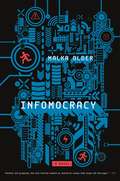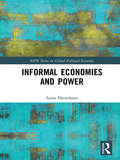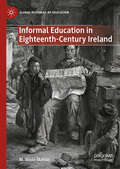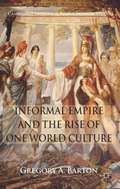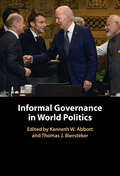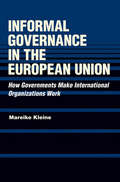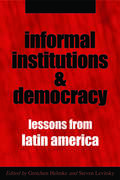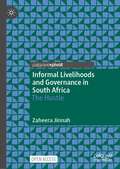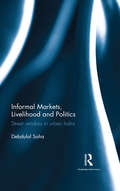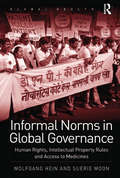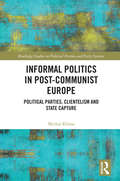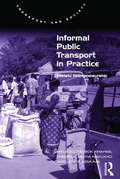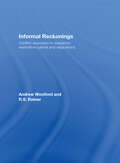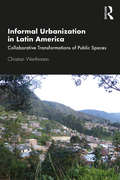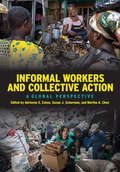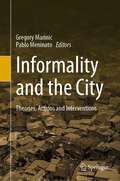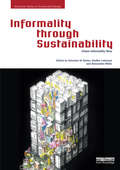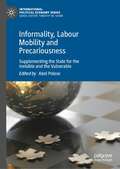- Table View
- List View
Infomocracy: Book One of the Centenal Cycle (The Centenal Cycle #1)
by Malka OlderRead Infomocracy, the first book in Campbell Award finalist Malka Older's groundbreaking cyberpunk political thriller series The Centenal Cycle, a finalist for the Hugo Award for Best Series, and the novel NPR called "Kinetic and gripping."• A Locus Award Finalist for Best First Novel• The book The Huffington Post called "one of the greatest literary debuts in recent history"• One of Kirkus' "Best Fiction of 2016"• One of The Washington Post's "Best Science Fiction and Fantasy of 2016"• One of Book Riot's "Best Books of 2016 So Far"It's been twenty years and two election cycles since Information, a powerful search engine monopoly, pioneered the switch from warring nation-states to global micro-democracy. The corporate coalition party Heritage has won the last two elections. With another election on the horizon, the Supermajority is in tight contention, and everything's on the line.With power comes corruption. For Ken, this is his chance to do right by the idealistic Policy1st party and get a steady job in the big leagues. For Domaine, the election represents another staging ground in his ongoing struggle against the pax democratica. For Mishima, a dangerous Information operative, the whole situation is a puzzle: how do you keep the wheels running on the biggest political experiment of all time, when so many have so much to gain?Infomocracy is Malka Older's debut novel.THE CENTENAL CYCLEBook 1: InfomocracyBook 2: Null StatesBook 3: State TectonicsPRAISE FOR INFOMOCRACY“A fast-paced, post-cyberpunk political thriller... If you always wanted to put The West Wing in a particle accelerator with Snow Crash to see what would happen, read this book.” —Max Gladstone, author of Last First Snow"Smart, ambitious, bursting with provocative extrapolations, Infomocracy is the big-data-big-ideas-techno-analytical-microdemoglobal-post-everything political thriller we've been waiting for." —Ken Liu, author of The Grace of Kings"In the mid-21st century, your biggest threat isn’t Artificial Intelligence—it’s other people. Yet the passionate, partisan, political and ultimately fallible men and women fighting for their beliefs are also Infomocracy’s greatest hope. An inspiring book about what we frail humans could still achieve, if we learn to work together." —Karl Schroeder, author of Lockstep and the Virga sagaAt the Publisher's request, this title is being sold without Digital Rights Management Software (DRM) applied.
Informal Coalitions and Policymaking in Latin America: Ecuador in Comparative Perspective
by Andrés Mejía AcostaThis book explains how presidents achieve market-oriented reforms in a contentious political environment. Using an impressive amount of quantitative and qualitative empirical evidence, most of which is reported for the first time, Mejía Acosta argues that presidents in Ecuador adopted significant reforms by crafting informal yet functional coalitions with opposition parties in congress. This pattern of success is particularly relevant in a country known for its chronic political fragmentation and deep regional and ethnic divisions. Paradoxically, the adoption of constitutional reforms to promote governance undermined the success of informal coalitions and directly contributed to greater regime instability after 1996. Mejía Acosta's work offers a compelling analysis of how formal and informal political institutions contribute to policy change. His far-reaching conclusions will capture the attention of political scientists and scholars of Latin America.
Informal Economies and Power: Rethinking Informality, Resilience And Violence In Kosovo (RIPE Series in Global Political Economy)
by Anna DanielssonThe global ubiquity of informal economic activities has turned informality into a key policy question, not least in international peace- and state-building. This book explores a core aspect of economic informality: its resilience despite comprehensive international anti-informality operations. Using Kosovo as an illustrative case, Danielsson suggests that to understand the resilience of informality, two distinct areas of practice need to be studied in conjunction rather than separately. The first concerns the professional practices enacted by international organisations in their attempts to formalise the informal economy in Kosovo. The second area of practice concerns the everyday informal economic practices of social agents in Kosovo. To study these areas of practice at their junction, Danielsson uses Pierre Bourdieu’s concept of symbolic power and argues that in post-conflict Kosovo, the distinct practices have become interwoven and co-constitutive of a novel ordering and meaning of informality. The resilience of the informal thus plays out through – while undermining and reinforcing the need of – the international anti-informality operations. Including scholarship from global governance, global political economy and social theory, this book’s original perspective on informal economies and power will appeal to scholars and professionals located in peace studies, development studies, and the field of international relations.
Informal Economies in Post-Socialist Spaces
by Abel Polese Jeremy MorrisInformed by in-depth case studies focusing on a wide spectrum of micro and macro post-socialist realities from Lithuania to Kosovo, from Ukraine to China, this volume demonstrates the multi-faceted nature of informality and suggests that it is a widely diffused phenomenon, used at all levels of a society and by both winners and losers of post-socialist transition. In particular, by critically engaging with concepts such as bribery, nepotism and illegal transactions in general, the collection suggests that informality has a systemic reality not only at the micro but also, and more importantly, at the macro level. In an attempt to move beyond functionalist or structuralist perspectives, the authors propose that informality at the macro scale is an alternative way of responding to policy-making and that its reality must inform policy decisions.
Informal Education in Eighteenth-Century Ireland (Global Histories of Education)
by M. Wade MahonThis book documents an informal system of education that emerged in Ireland between the late 1750s and the end of the century, a system that operated largely without funding or direction by church or state. In a society as divided as eighteenth-century Ireland, it is remarkable that such a system could succeed, paving the way for the more formal reforms of Irish education that followed in the nineteenth century. Based on detailed evidence from newspaper advertisements, directories, educational prospectuses, textbooks, and other print documents from the period as well as previously unexamined manuscript resources, the author describes this system and how it functioned, emphasizing the transnational dimensions of print culture, English literature, and education reform.
Informal Empire and the Rise of One World Culture
by Gregory A. BartonInformal empire is a key mechanism of control that explains much of the configuration of the modern world. This book traces the broad outline of westernization through elite formations around the world in the modern era. It explains why the world is western and how formal empire describes only the tip of the iceberg of British and American power.
Informal Governance in World Politics
by Kenneth W. Abbott Thomas J. BierstekerThroughout the nineteenth and twentieth centuries, cooperation among nations was based on international regimes and formal intergovernmental organizations. However, since the 1990s, informal modes of global governance, such as informal intergovernmental organizations and transnational public-private governance initiatives, have proliferated. Even within formal intergovernmental organizations, informal means of influence and informal procedures affect outcomes whilst, around all these institutions, even more informal networks shape agendas. This volume introduces and analyzes these three types of informality in governance: informality of, within, and around institutions. An introductory chapter traces the rise of informal governance and suggests a range of theoretical perspectives and variables that may explain this surge. Empirical chapters then apply these and other explanations to diverse issue areas and cross-cutting issues, often using newly developed datasets or original case study research. The concluding chapter sets out a research agenda on informality in global governance, including its normative implications.
Informal Governance in the European Union: How Governments Make International Organizations Work
by Mareike KleineThe European Union is the world’s most advanced international organization, presiding over a level of legal and economic integration unmatched in global politics. To explain this achievement, many observers point to its formal rules that entail strong obligations and delegate substantial power to supranational actors such as the European Commission. This legalistic view, Mareike Kleine contends, is misleading. More often than not, governments and bureaucrats informally depart from the formal rules and thereby contradict their very purpose. Behind the EU’s front of formal rules lies a thick network of informal governance practices.If not the EU’s rules, what accounts for the high level of economic integration among its members? How does the EU really work? In answering these questions, Kleine proposes a new way of thinking about international organizations. Informal governance affords governments the flexibility to resolve conflicts that adherence to EU rules may generate at the domestic level. By dispersing the costs that integration may impose on individual groups, it allows governments to keep domestic interests aligned in favor of European integration. The combination of formal rules and informal governance therefore sustains a level of cooperation that neither regime alone permits, and it reduces the EU’s democratic deficit by including those interests into deliberations that are most immediately affected by its decisions. In illustrating informal norms and testing how they work, Kleine provides the first systematic analysis, based on new material from national and European archives and other primary data, of the parallel development of the formal rules and informal norms that have governed the EU from the 1958 Treaty of Rome until today.
Informal Institutions and Democracy: Lessons from Latin America
by Gretchen HelmkeThis volume analyzes the function of informal institutions in Latin America and how they support or weaken democratic governance. Drawing from a wide range of examples—including the Mexican dedazo, clientelism in Brazil, legislative "ghost coalitions" in Ecuador, and elite power-sharing in Chile—the contributors examine how informal rules shape the performance of state and democratic institutions, offering fresh and timely insights into contemporary problems of governability, "unrule of law," and the absence of effective representation, participation, and accountability in Latin America.The editors present this analysis within a fourfold conceptual framework: complementary institutions, which fill gaps in formal rules or enhance their efficacy; accommodative informal institutions, which blunt the effects of dysfunctional formal institutions; competing informal institutions, which directly subvert the formal rules; and substitutive informal institutions, which replace ineffective formal institutions.
Informal Labor, Formal Politics, and Dignified Discontent in India
by Rina AgarwalaSince the 1980s, the world's governments have decreased state welfare and thus increased the number of unprotected 'informal' or 'precarious' workers. As a result, more and more workers do not receive secure wages or benefits from either employers or the state. This book offers a fresh and provocative look into the alternative social movements informal workers in India are launching. It also offers a unique analysis of the conditions under which these movements succeed or fail. Drawing from 300 interviews with informal workers, government officials and union leaders, Rina Agarwala argues that Indian informal workers are using their power as voters to demand welfare benefits from the state, rather than demanding traditional work benefits from employers. In addition, they are organizing at the neighborhood level, rather than the shop floor, and appealing to 'citizenship', rather than labor rights.
Informal Livelihoods and Governance in South Africa: The Hustle
by Zaheera JinnahThis open access book offers a compelling account of everyday life, livelihoods, and governance in post-apartheid South Africa among the urban poor and marginalized, anchored in and through a critique of the concept of informality, or living outside of the state, its laws, services, and protection. Using a case study of the Zama Zama, loosely translated from the isiZulu as ‘to hustle, or to strive’ and colloquially used to refer to those working as informal artisanal miners on Johannesburg’s numerous disused and abandoned gold mines, the book documents an ethnography of this community’s everyday lives, struggles, and hopes. It provides an intimate account of a community, its social relations, and its political relationship to the state. The narratives of the Zama Zama are used to raise broader questions about precarity, belonging, and governance in post-apartheid South Africa, and suggest that pervasive informality could risk the country's democratic order.
Informal Markets, Livelihood and Politics: Street vendors in urban India
by Debdulal SahaLow industrial growth, declining agricultural sector and limited expansion of formal sector employment in India have increasingly forced the poor to take recourse to informal sources of livelihoods. Street vending is one such thriving source of self-employment across cities. This book delves into the sustenance and survival strategies of street vendors across 17 cities in India and assesses the issues revolving around self-created markets, livelihood and politics that are contested in public space. It also presents a conceptual and theoretical understanding of different socio-economic and policy concerns pertaining to street vending in the country. The study shows how despite the absence of legal frameworks and institutional support, these urban self-employed informal workers subsist by arranging ad-hoc alternatives, creating informal institutions and negotiating with formal and informal actors in the market. It also discusses the Street Vendors (Protection of Livelihood and Regulation of Street Vending) Act, 2014, and examines how inclusive the legal recognition is for these workers of informal economy. Drawing on exhaustive research and a wealth of primary data, this book will be useful to scholars and researchers in development studies, labour studies, economics, sociology and those in public policy and urban planning.
Informal Norms in Global Governance: Human Rights, Intellectual Property Rules and Access to Medicines (Global Health)
by Wolfgang Hein Suerie MoonHein and Moon take up a serious problem of contemporary global governance: what can be done when international trade rules prevent the realization of basic human rights? Starting in the 1990s, intellectual property obligations in trade agreements required many developing countries to begin granting medicines patents, which often rendered lifesaving drugs unaffordable. At stake was the question of what priority would be given to health-particularly of some of the world’s poorest people-and what priority to economic interests, particularly those of the most powerful states and firms. This book recounts the remarkable story of the access to medicines movement. The authors offer an explanation for how the informal, but powerful norm that every person should have access to essential medicines emerged after a decade of heated political contestation and against long odds. They also explore the stability and scope of the norm. Finally, the book examines the limitations of informal norms for protecting human rights, and when renewed focus on changing formal norms is warranted.
Informal Order and the State in Afghanistan
by Jennifer Brick MurtazashviliDespite vast efforts to build the state, profound political order in rural Afghanistan is maintained by self-governing, customary organizations. Informal Order and the State in Afghanistan explores the rules governing these organizations to explain why they can provide public goods. Instead of withering during decades of conflict, customary authority adapted to become more responsive and deliberative. Drawing on hundreds of interviews and observations from dozens of villages across Afghanistan, and statistical analysis of nationally representative surveys, Jennifer Murtazashvili demonstrates that such authority enhances citizen support for democracy, enabling the rule of law by providing citizens with a bulwark of defence against predatory state officials. Contrary to conventional wisdom, it shows that 'traditional' order does not impede the development of the state because even the most independent minded communities see a need for a central government - but question its effectiveness when it attempts to rule them directly and without substantive consultation.
Informal Politics in Post-Communist Europe: Political Parties, Clientelism and State Capture (Routledge Studies on Political Parties and Party Systems)
by Michal KlímaThis book offers a fascinating, thought-provoking and ground-breaking study of post-communist political life. It is published just as the countries of Central and Eastern Europe mark thirty years since gaining freedom and have embarked on the path of democracy. This book is one of the first full-length academic works to explore the question of how informal structures, headed by bosses, godfathers and oligarchs, affect formal party politics and democracy. The unique post-communist transition is observed as a specific historical moment of disorder, offering a window of opportunity for the large-scale exploitation of public resources in the sense of a kind of "Klondike Gold Rush." Phenomena of corruption, clientelism, patronage, party capture and state capture are topical themes that are deeply explored. This text will be of key interest to scholars and students of Central and Eastern European politics, democratisation, transitional societies, clientelism, party systems and more broadly of comparative and European politics.
Informal Power in the Greater Middle East: Hidden Geographies (Routledge Studies in Middle Eastern Democratization and Government)
by Andrea Teti Luca Anceschi Gennaro GervasioOver the last decade or so, academic and non-academic observers have focussed mainly, if not exclusively on the institutions and places of formal power in the Greater Middle East, depicting politics in the region as a small area limited to local authoritarian rulers. In contrast, this book aims to explore the ‘hidden geographies’ of power, i.e. the political dynamics developing inside, in parallel to, and beyond institutional forums; arguing that these hidden geographies play a crucial role, both in support of and in opposition to official power. By observing less frequented spaces of power, co-option, and negotiation, and particularly by focusing on the interplay between formal and informal power, this interdisciplinary collection provides new insights in the study of the intersection between policy-making and practical political dynamics in the Greater Middle East. Contributing a fresh perspective to a much-discussed topic, Informal Power in the Greater Middle East will be an invaluable resource for students, scholars and those interested in the politics of the region.
Informal Public Transport in Practice: Matatu Entrepreneurship (Transport And Society Ser.)
by Meleckidzedeck Khayesi Fredrick Muyia NafukhoTransport discourse often concentrates on what is missing from transport policy and practice in developing countries vis-Ã -vis high-income countries rather than articulating local creativity in responding to transport needs as revealed in informal public transport modes such as matatu, motorcycle, bicycle and animal transport. This book helps to correct some of the tendency of inadequate contextualization of knowledge, technology and practice learning and transfer from one setting to another in transport and other development programmes. While countries such as Kenya have ambitions to develop their transport systems to fit into the globalized transport system, they also need to plan transport for ordinary life in both urban and rural areas. The matatu service, provided by privately-owned transport carriers, can be seen as a mirror of the life of Kenya, revealing how indigenous African entrepreneurship and capitalism straddles various economic, political and social systems. This book offers a phenomenological and situated analysis of the matatu entrepreneurship in the political economy of Kenya and its embeddedness in society. By adopting a social science approach, this book highlights a number of political, social and practical issues to demonstrate the matatu is not a decontextualized, disembodied and lifeless piece of moving metal carrying people and goods but rather part of a self-organizing industry, with its own logic of practice. This book is dedicated to Ajanga Khayesi.
Informal Reckonings: Conflict Resolution in Mediation, Restorative Justice, and Reparations
by Andrew Woolford R.S. RatnerThe 'reparational turn' in the field of law has resulted in the increased use of so-called 'informal' approaches to conflict resolution, including primarily the three mechanisms considered in this book: mediation, restorative justice and reparations. While proponents of these mechanisms have acclaimed their communicative and democratic promise, critics have charged that mediation, restorative justice and reparations all potentially serve as means for encouraging citizens to internalize and mimic the rationalities of governance. Indeed, the critics suggest that informal justice's supposed oppositional relationship to formal justice is, at base, a mutually reinforcing one, in which each system relies on the other for its effective operation, rather than the two being locked in a struggle for dominance. This book contributes to the discussion of the confluence of informal and formal justice by providing a clearer picture of the justice 'field' through the notion of the 'informal/formal justice complex.' This term, adapted from Garland and Sparks (2000), describes a cultural formation in which adversarial/punitive and conciliatory/restorative justice forms coexist in relative harmony despite their apparent contradictions. Situating this complex within the context of neoliberalism, this book identifies the points of rupture in the informal/formal justice complex to pinpoint how and where a truly alternative and 'transformative' justice (i.e. a justice that challenges and counters the hegemony of formal legal practices, opening the field of law to a broader array of actors and ideas) might be established through the tools of mediation, restorative justice and reparations.
Informal Social Protection and Poverty
by Zahid MumtazThis book analyzes the importance of informal social protection provided by religious institutions such as madrassas in a low-income country such as Pakistan. This book explains that Madrassas are religious schools that have existed in many Muslim countries for centuries and contributed significantly to preserving, forming, and extending human knowledge in medieval times. Further, madrassas are now more commonly viewed as the providers of a narrow education, supporting religious fundamentalism, that may lead to terrorism. However, this book asserts that education is not the only function performed by madrassas. They are a significant source of welfare support for the vulnerable and marginalized households in many low-income countries. This book helps the readers to understand the concept of informal social protection not conceptualized previously. In addition, its various attributes and institutions providing such a form of welfare worldwide are explained in detail; analyzing the usefulness of such a form of social protection would benefit readers of social policy, national governments, and international donor/aid agencies. This book also provides a prescriptive framework for integrating formal and informal social protection. This book provides a new "Multiple Regime Framework", for identifying various regimes in one country at one point in time by applying a novel data collection and analysis methodology. The application of this framework would be of particular interest to social policy scholars, national governments, and donor/aid agencies because it will result in better targeting of social protection policies in the wake of fiscal constraints. Lastly, this book provides a novel data collection and analysis strategy that will benefit the reader of research methodology, development consultants, donor agencies, and policy practitioners interested in using artificial intelligence to make informed and targeted policy decisions.
Informal Urbanization in Latin America: Collaborative Transformations of Public Spaces
by Christian WerthmannVarious kinds of informal and extra-legal settlements—commonly called shantytowns, favelas, or barrios—are the prevailing type of urban land use in much of the developing world. United Nations estimates suggest that there are close to 900 million people living in squatter communities worldwide, with the number expected to increase in the coming decades. Informal Urbanization in Latin America investigates prevailing strategies for addressing informal settlements, which started to shift away from large-scale slum clearance to on-site upgrading in Latin America over the last 40 years, by improving public spaces, infrastructure and facilities. The cases in this book range from one micro intervention (the Villa Tranquila Project in Buenos Aires) to three large-scale government-run projects: the celebrated Favela Bairro Program in Rio de Janeiro, the social housing program in São Paulo and the famous Proyectos Urbanos Integrales Approach in Medellín. The cases show a collaborative and sensitive transformation of landscape and public space, and provide designers and planners with the tools to develop better strategies that can mitigate the volatility that the residents of non-formal neighborhoods are exposed to. The book is a must-read for all who are interested or working in the global urbanization as well as social equity.
Informal Work in Developed Nations (Routledge Advances in Heterodox Economics)
by Colin C. Williams Enrico Marcelli Pascale JoassartAlmost everyone residing in a developed nation knows someone who has engaged in paid work that is licit but not reported to the government (e.g., babysitting, gardening, construction, financial consulting). But while most acknowledge that such work is helpful to the individuals involved, and that informal work may enhance a sense of community, most scholars view it as a pre-modern form of exchange and something that disappears as capitalist markets expand globally. Both mainstream and heterodox economics typically assume that there is an inevitable shift towards the formalization of goods and services provisioning as societies become more "advanced" or "developed" (the "formalization thesis"). In these views, the existence of informal activities is a manifestation of backwardness and it is assumed that they will disappear as an economy becomes more "modern." This book challenges these conventional theses about the linear trajectory of informal work and economic development by arguing that informal work is not trivial for understanding modern capitalist economies, and that both mainstream and heterodox theories about the economy must be altered to address the role of informal work in relatively developed economies. This edited collection focuses on informal work in various developed nations, including Canada, the United States, and several in Europe. It will therefore be of interest to policymakers, as well as students and researchers in development studies, social policy, sociology, anthropology, public health, geography, economics and planning. Enrico Marcelli is Assistant Professor of Sociology at San Diego State University, USA. Colin C. Williams is Professor of Public Policy at the University of Sheffield, UK. Pascale Joassart is Assistant Professor of Geography at San Diego State University, USA.
Informal Workers and Collective Action: A Global Perspective
Informal Workers and Collective Action features nine cases of collective action to improve the status and working conditions of informal workers. Adrienne E. Eaton, Susan J. Schurman, and Martha A. Chen set the stage by defining informal work and describing the types of organizations that represent the interests of informal workers and the lessons that may be learned from the examples presented in the book. Cases from a diverse set of countries—Brazil, Cambodia, Colombia, the Dominican Republic, Georgia, Liberia, South Africa, Tunisia, and Uruguay—focus on two broad types of informal workers: "waged" workers, including port workers, beer promoters, hospitality and retail workers, domestic workers, low-skilled public sector workers, and construction workers; and self-employed workers, including street vendors, waste recyclers, and minibus drivers.These cases demonstrate that workers and labor organizations around the world are rediscovering the lessons of early labor organizers on how to aggregate individuals' sense of injustice into forms of collective action that achieve a level of power that can yield important changes in their work and lives. Informal Workers and Collective Action makes a strong argument that informal workers, their organizations, and their campaigns represent the leading edge of the most significant change in the global labor movement in more than a century.ContributorsGocha Aleksandria, Georgian Trade Union ConfederationMartha A. Chen, Harvard University and WIEGO Sonia Maria Dias, WIEGO and Federal University of Minas Gerais, BrazilAdrienne E. Eaton, Rutgers, the State University of New JerseyMary Evans, Rutgers, the State University of New JerseyJanice Fine, Rutgers, the State University of New JerseyMary Goldsmith, Universidad Autónoma Metropolitana-XochimilcoDaniel Hawkins, National Trade Union School of ColombiaElza Jgerenaia, Labor and Employment Policy Department for the Ministry of Labour, Health and Social Affairs, Republic of GeorgiaStephen J. King, Georgetown UniversityAllison J. Petrozziello, UN Women and the Center for Migration Observation and Social DevelopmentPewee Reed, Ministry of Commerce and Industry, Republic of LiberiaSahra Ryklief, International Federation of Workers' Education AssociationsSusan J. Schurman, Rutgers, the State University of New JerseyVera Alice Cardoso Silva, Federal University of Minas Gerais, BrazilMilton Weeks, Devin Corporation
Informality and the City: Theories, Actions and Interventions
by Gregory Marinic Pablo MeninatoThis book advances the agenda of informality as a transnational phenomenon, recognizing that contemporary urban and regional challenges need to be addressed at both local and global levels. This project may be considered a call for action. Its urgency derives from the impact of the pandemic combined with the effects of climate change in informal settlements around the world. While the notion of “the informal” is usually associated with the analysis and interventions in informal settlements, this book expands the concept of informality to acknowledge its interdisciplinary parameters.The book is geographically organized into five sections. The first part provides a conceptual overview of the notion of “the informal,” serving as an introduction and reflection on the subject. The following sections are dedicated to the principal regions of the Global South—Latin America, US–Mexico Borderlands, Asia, and Africa—while considering the interconnections and correspondences between urbanism in the Global South and the Global North.This book offers a critical introduction to groundbreaking theories and design practices of informality in the built environment. It provides essential reading for scholars, professionals, and students in urban studies, architecture, city planning, urban geography, sociology, anthropology, cultural studies, economics, and the arts. As a critical survey of informality, the book examines history, theory, and production across a range of informal practices and phenomena in urbanism, architecture, activism, and participatory design. Authored by a diverse and international cohort of leading educators, theorists, and practitioners, 45 chapters refine and expand the discourse surrounding informal cities.
Informality through Sustainability: Urban Informality Now (Earthscan Series On Sustainable Design Ser.)
by Steffen Lehmann Alessandro Melis Antonino Di RaimoInformality through Sustainability explores the phenomenon of informality within urban settlements and aims to unravel the subtle links between informal settlements and sustainability. Penetrating its global profile and considering urban informality through an understanding of local implications, the authors collectively reveal specific correlations between sites and their local inhabitants. The book opposes simplistic calls to legalise informal settlements or to view them as ‘problems’ to be solved. It comes at a time when common notions of ‘informality’ are being increasingly challenged. In 25 chapters, the book presents contributions from well-known scholars and practitioners whose theoretical or practical work addresses informality and sustainability at various levels, from city planning and urban design to public space and architectural education. Whilst previous studies on informal settlements have mainly focused on cases in developing countries, approaching the topic through social, cultural and material dimensions, the book explores the concept across a range of contexts, including former Communist countries and those in the so-called Global North. Contributions also explore understandings of informality at various scalar levels – region, precinct, neighbourhood and individual building. Thus, this work helps reposition informality as a relational concept at various scales of urbanisation. This book will be of great benefit to planners, architects, researchers and policymakers interested in the interplay between informality and sustainability.
Informality, Labour Mobility and Precariousness: Supplementing the State for the Invisible and the Vulnerable (International Political Economy Series)
by Abel PoleseFrom the erosion of state legitimacy in Lebanon to the use of smartphones in Kyrgyzstan, from a Polish suburb to the music scene in Azerbaijan, this volume attempts to explain why, in a variety of world regions, a substantial number of people tend to ignore or act against state rules. We propose to look at informality beyond simplistic associations of the phenomenon with a single category such as "informal labour" or "corruption". By doing this, we propose to look for a correlation between the emergence, and persistence, of some informal practices and the quality of governance in a given area. We also suggest that a better understanding of the variety of informal practices present in a region can help conceptualising more adequate interventions and eventually improve the socio-economic conditions of its inhabitants.
